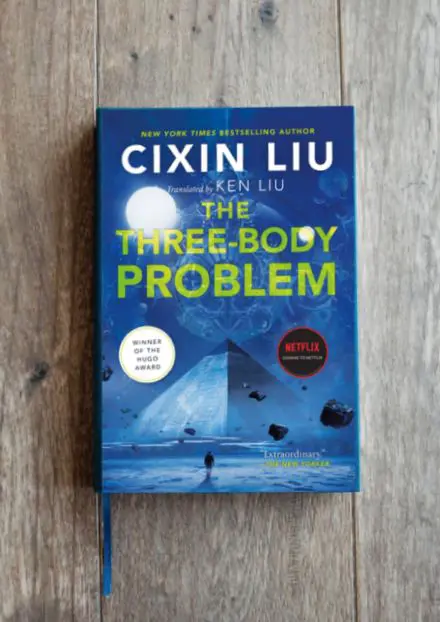We delve into the world of science fiction in the latest episode of the Fully-Booked podcast. The hosts, Meaghan and Arthur, express their excitement and curiosity about the genre, particularly focusing on its evolution and the rising popularity of “hard science fiction.”
They begin by discussing the intriguing concept of how science fiction heroes utilize real science to address relatable challenges, making the genre both accessible and compelling. This exploration sets the tone for an episode filled with diverse discussions on books, subgenres, and broader thematic elements within science fiction.
Note
The following is an editorialized transcript of our weekly literary podcast. If you would like to listen to the podcast, click the play button above orlisten on your favorite platform with the links below.
What’s on the Nightstand: Exploring Current Reads

ISBN: 9780356521428
The hosts share their current reading adventures; Arthur is engrossed in Revenant-X, the second book in the Red Space series by David Wellington, which masterfully blends sci-fi and horror. He highlights how the first book, Paradise-1, and its sequel create a gripping narrative.
Similarly, Transmentation Transience by Darkly Lem, an ARC due for release in March, captivates him with its mix of multiverse adventure and theoretical science. The book, closely compared to The Expanse and Jeff VanderMeer’s works, promises to be a groundbreaking addition to science fiction.
Meaghan shares her thoughts on Liar’s Kingdom by Christine Calella, a reimagining of Cinderella’s story that dives into life after the glass slipper moment. This ARC explores themes of freedom, identity, and personal growth with a fantasy twist. She also discusses Hitchcock Hotel by Stephanie Wrobel, a thrilling story about a group of friends reuniting in a Hitchcock-themed hotel, where unresolved issues lead to chaos. Despite struggling with unlikable characters, Meaghan finds the narrative intriguing.
RelatedThe Sci-Fi Book That Took 51 Years To Be Published
Science Fiction Subgenres: Classic vs. Hard Science

The conversation shifts to defining science fiction and its subgenres, particularly the distinction between traditional and hard science fiction. Science fiction, the hosts note, often extrapolates from current scientific principles to create fantastical worlds. However, hard science fiction grounds itself more firmly in existing theories and factual science, requiring detailed research and plausible explanations for technological advancements.
The hosts point to Andy Weir’s novels, such as The Martian and Project Hail Mary, as prime examples of hard science fiction that resonate with readers by emphasizing problem-solving and scientific accuracy.
They emphasize the genre’s flexibility, blending elements of romance, horror, fantasy, and more. This adaptability has made science fiction a broad and enduring genre, with examples ranging from Mary Shelley’s Frankenstein to contemporary narratives. The hosts marvel at how even foundational works, like Frankenstein, integrate hard science elements – such as reanimation through electricity – while delving into complex themes of humanity and ethics.
Enjoying this article?
Subscribe to our weekly newsletterThe Appeal of Hard Science Fiction

ISBN: 9780593135204
Andy Weir’s books dominate much of the discussion as the hosts explore his ability to balance humor, adventure, and scientific rigor. We think Weir’s meticulous research and collaboration with experts, including NASA scientists, lend authenticity to his narratives. In The Martian, for instance, the protagonist’s survival on Mars involves ingenious uses of science, from creating nutrient-rich soil to generating water.
Project Hail Mary takes the concept further, presenting a lone protagonist on a mission to save Earth from an energy-depleting parasite. The story integrates universal scientific principles to create a unique communication method between humans and alien species, making it both intellectually stimulating and emotionally engaging. While Artemis shifts gears to a murder mystery on the moon, the hosts note that it retains elements of hard science, showcasing Weir’s versatility.
The hosts admire how Weir’s works balance technical detail with relatability, creating stories that are accessible even to readers without a strong science background. They suggest that this blend of authenticity and entertainment makes his books appealing to a broad audience.
Related10 Captivating Sci-Fi Books For Young Readers
Enduring Works and Adaptations: Exploring Science Fiction’s Legacy

ISBN: 9780765382030
The discussion broadens to include other influential works in the genre. The hosts praise The Expanse for its blend of hard science and expansive storytelling, and they highlight Liu Cixin’s The Three-Body Problem trilogy for its deep exploration of physics and extraterrestrial concepts. While acknowledging the intellectual challenge these works may pose for some readers, they emphasize their contribution to the genre’s evolution.
The hosts also explore classic works like Jules Verne’s 20,000 Leagues Under the Sea, illustrating how early science fiction integrated hard science principles. Verne’s meticulous descriptions of marine life and submarine technology reflect the genre’s potential to educate and inspire. They compare this to Mary Shelley’s Frankenstein, noting how these classics continue to influence modern science fiction.
Adaptations of these works, such as the Netflix series based on the Three-Body Problem, demonstrate the genre’s enduring appeal. However, the hosts caution that adaptations must balance complexity with accessibility to resonate with a wider audience. They cite the mixed reception of League of Extraordinary Gentlemen and The Dark Tower as examples of how challenging it can be to translate dense literary material into engaging screen narratives.
RelatedThis Is The Rarest And Most Expensive Sci-Fi Book
The Popularity of Science Fiction Today

We believe science fiction’s increasing popularity stems from its ability to combine adventure with intellectual depth. Films like The Martian and series like For All Mankind attract audiences by blending relatable human experiences with scientific exploration. The humor and ingenuity of the characters in these narratives make them both entertaining and thought-provoking.
We think hard science fiction’s appeal lies in its grounding in reality, which allows readers to connect with the material on a deeper level. The hosts acknowledge, however, that the genre’s technical focus may limit its accessibility for some audiences. Nonetheless, they celebrate its capacity to inspire curiosity and expand horizons.
An Invitation to Explore
The episode concludes with an invitation for listeners to share their thoughts on science fiction. The hosts encourage engagement through social media and the Fully-Booked website, emphasizing the genre’s diversity and its potential to captivate readers of all backgrounds. As we reflect on the discussions, it’s clear that science fiction offers something for everyone – from thrilling adventures to profound explorations of human nature and the universe.



















